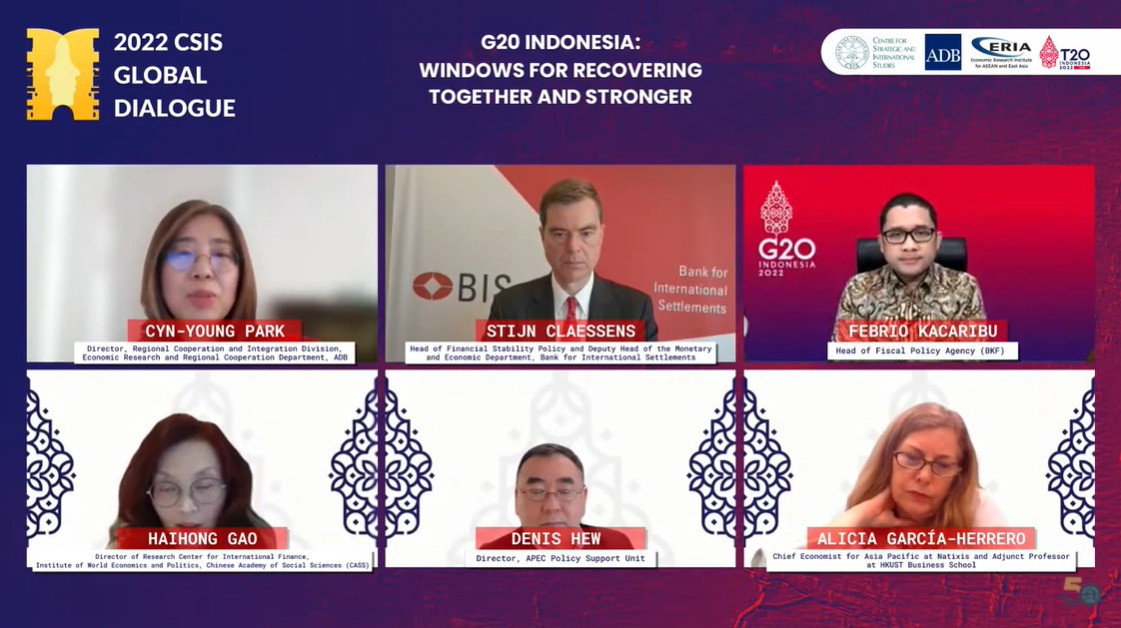Popular Reads
Top Results
Can't find what you're looking for?
View all search resultsPopular Reads
Top Results
Can't find what you're looking for?
View all search resultsThe shock is coming: Economists warn of inflation in Asia
Panelists at an international conference hosted by an Indonesia think tank have pointed to challenges ahead as central banks and policymakers seek to sustain economic growth while containing inflation.
Change text size
Gift Premium Articles
to Anyone
 A screenshot from YouTube shows the panelists of Plenary Session 3 of the 2022 Centre for Strategic and International Studies Global Dialogue on April 28, which includes (from left) Cyn-Young Park from the Asian Development Bank (ADB), Stijn Claessens from the Bank for International Settlements (BIS), Febrio Kacaribu from the Indonesian Finance Ministry’s Fiscal Policy Agency, Haihong Gao from the Chinese Academy of Social Sciences’ Institute of World Economics and Politics, Denis Hew from the APEC Policy Support Unit and Alicia García-Herrero from investment bank Natixis. (YouTube/screenshot)
A screenshot from YouTube shows the panelists of Plenary Session 3 of the 2022 Centre for Strategic and International Studies Global Dialogue on April 28, which includes (from left) Cyn-Young Park from the Asian Development Bank (ADB), Stijn Claessens from the Bank for International Settlements (BIS), Febrio Kacaribu from the Indonesian Finance Ministry’s Fiscal Policy Agency, Haihong Gao from the Chinese Academy of Social Sciences’ Institute of World Economics and Politics, Denis Hew from the APEC Policy Support Unit and Alicia García-Herrero from investment bank Natixis. (YouTube/screenshot)

Economists have warned that a range of global factors is fueling inflation in Asia and may put policymakers in a tight spot in the course of this year.
The speed of price increases has taken analysts by surprise and led to repeated upward revisions of inflation forecasts, Bank for International Settlements (BIS) economist Stijn Claessens said at a conference hosted online by the Jakarta-based Centre for Strategic and International Studies (CSIS) on April 28.
“So, this is really a question of a regime switch, at least for the advanced economies, but not only there because also in emerging markets we’ve seen these inflation surprises being quite consistent and quite persistent as well,” he said in his keynote speech for the third plenary session of the 2022 CSIS Global Dialogue.
The three-day conference is part of the Think20 (T20) series of events that brings together think tanks and research centers from around the world to provide input for the Group of Twenty forum, which Indonesia currently chairs.
“As we went into 2022, already there were some signs of weakening of the recovery, and on top of that, we have the conflict in Ukraine, which really added a global shock to what already was becoming a more fragile recovery,” noted Claessens, who serves as the head of financial stability policy and deputy head of the monetary and economic department of the BIS.
“The forecasts for this current year are very high; much, much above targets in both the euro area as well as in the United States, and in addition to that, of course, we’ve seen somewhat of an increase in Japan […] In emerging markets, we have seen these increases much more, and already earlier, and there we have now very high inflation in some countries,” the economist said, noting that China was an exception as inflation there was still relatively low.
He noted that when compared to the oil price shocks of the 1970s, the rise in commodity prices this time was much broader, partly because the world today faced supply disruptions “across the board”.
















